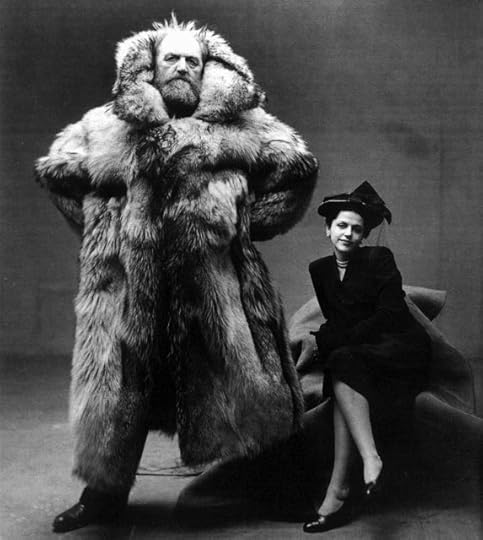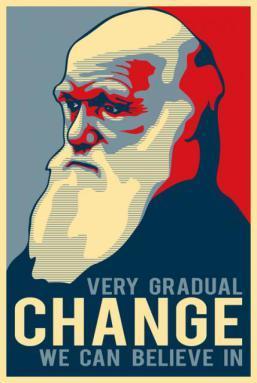Andrew Sullivan's Blog, page 378
January 25, 2014
“A Top Candidate For The Most Interesting Man In The World”
That’s what Kottke calls Peter Freuchen, standing there with his wife Dagmar in an old photo by Irving Penn:
Standing six feet seven inches, Freuchen was an arctic explorer, journalist, author, and anthropologist. He participated in several arctic journeys (including a 1000-mile dogsled trip across Greenland), starred in an Oscar-winning film, wrote more than a dozen books (novels and nonfiction, including his Famous Book of the Eskimos), had a peg leg (he lost his leg to frostbite in 1926; he amputated his gangrenous toes himself), was involved in the Danish resistance against Germany, was imprisoned and sentenced to death by the Nazis before escaping to Sweden, studied to be a doctor at university, his first wife was Inuit and his second was a Danish margarine heiress, became friends with Jean Harlow and Mae West, once escaped from a blizzard shelter by cutting his way out of it with a knife fashioned from his own feces, and, last but certainly not least, won $64,000 on The $64,000 Question.
Video of that appearance here.



Mac Guys vs PC Guys
A study suggests that brand advertising has failed to get inside the minds of computer users:
One hundred eight college students who had purchased either a Mac or PC laptop computer completed measures of the Big Five personality traits [Extraversion, Neuroticism, Openness to Experience, Agreeableness, Conscientiousness], ratings of brand characteristics of Macs and PCs, measures of implicit attitudes toward these products, and determinants of brand choices. Big Five personality traits did not differentiate between Mac and PC owners.
Students overall rated Macs higher on various product attributes (attractive style, cool, youthful, and exciting) and PCs higher on reasonable price and good for gaming. Brand owners rated their own brands higher on characteristics of reliability, good for homework, ease of use, good for Internet surfing, and good features. PC owners placed greater importance on cost as a determinant of brand choice, whereas Mac owners placed greater emphasis on style. … Mac owners showed more favorable implicit attitudes and stronger implicit self-identification with Macs than did PC owners.
(Hat tip: Christian Jarrett)



January 24, 2014
20,050 20,352
[Updated and re-posted from earlier today]
Last night I wondered if we could make it to 20,000 auto-renewing subscribers (out of 35,000 total subscribers) by the end of the week. You did it overnight. It confirms a new trend. The average subscription price is much higher than last year – try the “double chai” option increasingly popular with readers - and revenue in our second week this year is now twice what it was last year. And we have a day and a half to go. (Here’s a Washington Post piece on our progress.)
Can we get to 21,000 by Saturday night? Over to you, subscribers. Renew now! Renew here!
Update from a Founding Member:
I just, finally, renewed today, increasing to $39.98 – it’s the most I could realistically go to for now, and doubling the base amount after dipping my toe in last year at the minimum price. My suspicion is that today or this weekend you’ll see a spike in the number of people renewing, since it’s payday for a lot of folk and one that’s far enough away from the backlog of Christmas that we start to have what looks something like a disposable income again.
Another:
I renewed after one or two pitches from you, and did so at $5/month on auto-renewal. My wife and I have made 2014 the year of Balance and Order. We spent our holiday break organizing, throwing away, upgrading, cleaning, sorting, and generally deciding what was really important for us to feel ordered and balanced, and what wasn’t. We’re artists – we both have managed to find stable careers working in the arts, with two reasonably well-off salaries. We’re in our late 30s and have no children, so there is some (some) disposable income each month.
What I’ve come to love about The Dish since I was first introduced to you by Bill Maher about five years ago is that you, your staff, and all Dishheads order my day. I check the blog in the morning, during my lunch break, and again in the evening to catch up on developments throughout the day. During the political season, I find that the analysis and commentary helps order my own arguments pro and con for whichever issue is being debated. And as for balance – your occasional lack of it (for example, your reaction to Obama’s first debate performance) throws me out of sync, and I find I need to take a day or two off from reading The Dish, otherwise I might teeter over the edge.
So here’s to both of us maintaining more balance throughout the year. It’s only going to get crazier and crazier as we approach the mid-terms.
On that note:
I laughed out loud when I read the email from another subscriber who called you a “blowhard.” Because when I renewed my membership, I thought, “Well, he is a fucking blowhard, but he’s my fucking blowhard.”
(Photos of Dish subscribers used with permission)



The Selective Secrecy Of Bill De Blasio
If you were to describe the Israel lobby as a secretive group that enforces the policies of the Israeli government on American politicians in private gatherings, you would be called an anti-Semite. The idea that the Israel lobby is secretive and underhand plays into ancient anti-Semitic tropes. If you were to say about AIPAC that “a lobby is a night flower, it thrives in the dark and dies in the sun,” you would be regarded as an anti-Semite for the same reasons. If you were to note that an AIPAC official once responded to the idea that the lobby had been weakened by pushing a napkin across a table and said “You see this napkin? In twenty-four hours, we could have the signatures of seventy senators on this napkin,” you would be called an anti-Semite. If you were to claim that AIPAC was “the most effective general interest group … across the entire planet,” you would be suspected of anti-Semitic tendencies. (The source for these varied quotes is here.)
And if you were to say that AIPAC was so powerful it could get a left-liberal mayor of New York to give a speech so fulsome in its cravenness and excess it adds whole universes of meaning to the word “pander” and also insist that it be kept secret, even to the extent of hauling a reporter out of the hall, then all bets would be off. Why, after all, should AIPAC be in any way secretive about its completely legitimate, even civic-minded, lobbying of American public officials on behalf of the interests of a foreign government? The very idea is anti-Semitic, is it not? Why should any defender of Israel want to keep his remarks private? Even if you found nothing in the speech faintly controversial, why on earth the secrecy?
And yet here we are, with the lofty, pizza-challenged mayor of New York City, right after a landslide election, caught keeping a speech to AIPAC off his public itinerary and barring any press coverage of it. Weird, innit? What would he have to hide? Well here’s an audio of the speech that AIPAC, according to De Blasio, asked him to keep top-secret:
I’m not sure if that is the entirety of the speech, but let’s just note a few things. First up:
There is a philosophical grounding to my belief in Israel and it is my belief, it is our obligation, to defend Israel, but it is also something that is elemental to being an American because there is no greater ally on earth, and that’s something we can say proudly.
“No greater ally on earth”.
Just ponder that remark for a bit. How many troops did Israel send to fight with Americans in Iraq? None. Forty other countries did, led by the UK, Australia, and Poland. How many troops did Israel send to fight with Americans in Afghanistan? None. Fifty-nine other countries helped, also led by the UK. In both cases, this “greatest ally on earth” would have been extraordinarily counter-productive if it had been involved. That’s how useful an ally the country is in confronting our common enemies. Which allied defense minister recently publicly said of an internal security plan for the West Bank, shared confidentially among allies, that it was “not worth the paper it was written on” and that “the only thing that can ‘save us’ is for John Kerry to win a Nobel Prize and leave us in peace.” Israel’s. Which allied prime minister in recent years took the extraordinary step of lecturing the American president in front of the world press in the White House itself? Israel’s. I cannot think of any allied prime minister ever thinking about doing the same.
But this preposterous bullshit is what a left-liberal mayor felt obliged to serve up. Then this:
There is no deeper connection across boundaries than this connection we share.
Not with France, the oldest ally of the US? Not with Britain, the mother-country of the US? Not with any of the other countries whose sons have spilt blood on the same battlefields as Americans? Not with those who fought and died alongside Americans on D-Day? Then the astonishing statement that “part of my job description is to be a defender of Israel.” Really? And there I was thinking he was mayor of New York City! Would someone critical, say, of Israel’s continued settlements on the West Bank be barred as unqualified to be mayor of New York City? De Blasio is not taking any chances:
City Hall will always be open to AIPAC. When you need me to stand by you in Washington or anywhere, I will answer the call and I’ll answer it happily ’cause that’s my job.
Let me just leave you with the words of George Washington, who saw things a little differently:
The Nation, which indulges towards another an habitual hatred, or an habitual fondness, is in some degree a slave. It is a slave to its animosity or to its affection, either of which is sufficient to lead it astray from its duty and its interest …
A passionate attachment of one Nation for another produces a variety of evils. Sympathy for the favorite Nation, facilitating the
illusion of an imaginary common interest, in cases where no real common interest exists, and infusing into one the enmities of the other, betrays the former into a participation in the quarrels and wars of the latter, without adequate inducement or justification.
It leads also to concessions to the favorite Nation of privileges denied to others, which is apt doubly to injure the Nation making the concessions; by unnecessarily parting with what ought to have been retained; and by exciting jealousy, ill-will, and a disposition to retaliate, in the parties from whom equal privileges are withheld. And it gives to ambitious, corrupted, or deluded citizens, (who devote themselves to the favorite nation,) facility to betray or sacrifice the interests of their own country, without odium, sometimes even with popularity; gilding, with the appearances of a virtuous sense of obligation, a commendable deference for public opinion, or a laudable zeal for public good, the base or foolish compliances of ambition, corruption, or infatuation.”



Zero-Tolerance For Photoshop
#Fotoperiodismo y #Ética Ganador del #Pulitzer2013 despedio por @AP al alterar una fotografía http://t.co/qTpbP54HIU pic.twitter.com/rLBiPGwJSH
— ▀▄▀▄▀ Isma GH ▀▄▀▄▀ (@ismagh85) January 24, 2014
Pulitzer prize-winning photographer Narciso Contreras has confessed to doctoring one of the photos he took in Syria for the Associated Press:
When it comes to major Photoshop alterations, serious news organizations have a zero-tolerance policy, as AP freelance photographer Narciso Contreras recently discovered. After admitting that he had cloned out a piece of a Syrian conflict image, the news agency was forced to ‘sever ties’ with the Pulitzer Prize winner. The photo in question was taken in September of last year, and shows a Syrian opposition fighter taking cover during a firefight with government forces. In the original, a colleague’s camera can be seen in the bottom left corner of the image, a camera that Contreras decided to clone out before sending the picture in.
The AP flipped its shit; not only did the agency fire Contreras, it removed the entire library of his work from its public record. Yannick LeJacq questions whether that was the right call:
This final point about removing Contreras’s work from the visible archive of the AP’s history is particularly compelling. The AP, it seems, acted so swiftly and harshly because it has a reputation to uphold. It’s not only “the definitive source,” by its own description, but also “the world’s most trusted news organization.” And to its credit, the AP acted with commendable transparency by openly reporting on its own snafu.
But still: did it have to strike all of his work from the public record?
Roger Tooth, the Guardian’s head of photography, explains why the zero-tolerance policy matters:
Sacking someone, albeit a freelance, seems very draconian. It was a first offence after all – AP has carefully checked all Contreras’s 494 other photographs on their archive. A warning would have been more suitable, surely? Except that the major wire agencies and their clients rely on their images being totally authentic; that’s why news organisations like the Guardian spend many thousand of pounds each year on their contracts. In a news environment it’s all about a chain of trust: from the photographers through to the agencies, newspapers and websites, and then to the readers. If that chain is broken, any picture could be suspect, and that can’t be allowed to happen.
Adam Weinstein points out that other forms of manipulation, sometimes more egregious, are just fine with the AP and other news agencies:
Most news agencies have no interest in a photograph whose truth is messier, whose truth doesn’t hit a special emotional chord in our cockles. Crop it? Sure. Lighten it? Yeah, just a bit. Use this mid-action frame, and not the dozen before or after it? Yep. Add a caption to tell viewers exactly what they should get out of the image? Of course.
But good God, don’t Photoshop anything out! It’s laudable that the AP’s standard pays lip service to “truth and accuracy.” By its standards, Contreras absolutely made an unpardonable sin. But the “objective” news industry’s pretense to sinlessness is just as unpardonable.
James Estrin notes that this “type of ethical lapse happens with alarming frequency despite the clarity of the rules and the severe consequences that have befallen transgressors”:
In one of the most notorious cases, Brian Walski of The Los Angeles Timeswas fired in 2003 for combining elements of two images into one composite. Adnan Hajj, a freelance photographer working for Reuters was let go in 2006 after doctoring smoke in an image of an Israeli airstrike in Beirut. But unlike previous occurrences in which the violation was discovered by readers, bloggers or other photographers, this week’s case had a twist: Mr. Contreras — facing a moral dilemma and knowing the consequences — turned himself in.



Corporate Climate Culprits
Meet the companies responsible for producing the vast majority of our fossil fuels:
A recent paper by Richard Heede, from the Climate Accountability Institute, in Colorado, shows that just 90 companies produced two-thirds of the fossil fuels burned in the industrial era. That includes 50 investor-owned companies like Chevron and Exxon, 31 state-owned companies like Mexico’s Pemex, and nine government-run entities from the ex-Soviet Union, China and other countries.



Is Facebook Dying? Ctd
Dish readers are the best scrutinizers out there:
I saw the study you highlighted pop up across the Internet (including on Facebook, how meta!) a few days ago and I’m glad you brought some of the criticism to light. One that I have not seen pertains to a critical assumption. The model seems to fit the data pretty well, which is “Facebook” searches on Google. But then the authors make the assumption that searches on Google are a proxy for usage of the actual Facebook website. I’m no expert, but that seems like a strong assumption to make without knowing for sure if there is a good correlation. How many people actually access Facebook by typing it into Google instead of directly putting in the web address? Seems to me that Google searches are a better proxy for interest in news about Facebook the company. I’m no fan of Facebook and quite honestly I’d like to believe the predictions, but I’d like to know more from people who are in the field (any readers out there?) before believing the hype.
Another is on the same page:
I use Facebook daily. I haven’t googled it in years.
Another goes deeper:
To answer the question succinctly, “No” – and the reason is because of something that most people predicting its demise tend to miss: that being on Facebook is an interconnected experience; since it’s where your friends are, there are huge disincentives to leaving. Sure, I can go decide I’m going to “switch” to Google+, but if my friends aren’t there, what kind of experience am I going to have? This is not like trading in your AOL email account for Gmail, or switching Web browsers.
True, Facebook’s precursor, Myspace, did die, but keep in mind that at its peak, Myspace had 125 million users; Facebook is over one billion. That creates exponentially more interconnectedness.
Yes, some young people seem to be leaving the platform. They are the ones with the time and the inclination to make the switch, and don’t have the deep layers of friendship that an adult does, from childhood friends to college roommates to former co-workers. The real struggle for Facebook going forward is that it – and its stockholders – may have to get used to skewing older, because most of us probably aren’t going to leave.
One more:
Facebook itself has published a refutation to the study. They also show that using the same methodology as the Princeton researchers, that Princeton University is on the way out.
Heh.



Cliff Huxtable’s Homecoming
Reacting to the news that Bill Cosby is developing a new family sitcom for NBC, Poniewozik invokes Michael J. Fox, another former star the network recently tried to revive:
NBC’s reasons for wanting Cosby back are evident. The question will be: why does Cosby want to go back to NBC? The problem with The Michael J. Fox Show wasn’t Fox, who was and remains a gifted performer. It’s that he was in a tepid, generic show that seemed to have no idea behind it but, “Michael J. Fox, back on your TV again!” Despite a lot of talent, The Michael J. Fox Show almost seemed to go out of its way to be as unmemorable as possible, leaving it little selling point beyond the audience’s memories of Family Ties.
Likewise, Cosby was a famous name even when he brought The Cosby Show to primetime (with the same producers he’ll be working with now). But that wasn’t what made it great TV. It was that he had distinctive ideas about how to shake up the way families in general, and African American families in particular, were portrayed on TV, and he created memorable characters to express those ideas.
Willa Paskin is glad Cosby is coming back to TV, noting the decline of the black family sitcom since the ’90s:
Twenty-two years after he left television, Bill Cosby remains one of the few people who can get a black family show on a network again.
This is particularly mind-boggling given that the influence of The Cosby Show is all over television. Cliff and Clair Huxtable were exemplars of the now nearly ubiquitous TV-parenting technique that combines equal parts love and aggravation, and, when practiced at the high-level of Cliff and Clair, consists of very responsibly and reliably laughing at your children in instructive ways. No parent on any show from Modern Family to Mom does anything without Cliff and Clair hovering in the background, doing it a little better.
And Cosby’s recent stand-up material suggests that he is now positioned to be just as funny as a grandfather as he was as a dad. He seems to have been buffing the character of the slightly-doddering, cutting-in-flashes, exasperating and exasperated husband and grandpa for quite some time.
Alyssa wonders why Cosby has to star in the show himself:
He’s 76, so is he going to play a grandfather whose primary role in the show, as Cosby’s has been in the real world of late, to tell parents who are in the process of raising their own children either that they’re doing it wrong, or how to do it better? Maybe that will work. And maybe Cosby will give a huge lift to the younger African-American actors who end up in his orbit, which I think would be the most important potential outcome of Cosby’s return to television.
But why is putting Cosby at the center of a show, rather even than having him create a show that stars other actors, the best option? … Because the number of black male characters on television are so limited, and even more so black men who have families, bringing Cosby underscores a depressing self-fulfilling assumption in Hollywood: that there are only a very small number of black actors that audiences will resonate to.



Face Of The Day
Supporters of the Muslim Brotherhood chant slogans and raise four fingers, the symbol known as “Rabaa”, which means four in Arabic, remembering those killed in the crackdown on the Rabaa al-Adawiya protest camp in Cairo last year, during a demonstration in Cairo on January 24, 2014. A suicide bomber struck Cairo police headquarters on Friday, the first of three bombings in the Egyptian capital that killed five people ahead of the anniversary of the 2011 uprising. By Mahmoud Khaled/AFP/Getty Images.



January 23, 2014
The Best Of The Dish Today
A sudden landslide for marriage equality? Is Facebook like an infectious disease? How weirdly corrupt was Bob McDonnell? How duplicitous are the neocons in their campaign for a second war in the Middle East? And on Iran, what would George Kennan do?
The most popular post of the day was yesterday’s Best of the Dish! Runner-up: And Suddenly The Door Gives Way.
We currently have 19,889 renewed subscribers. Make it 20,000 by the end of the week?
And see you in the morning.
(Photo: The sedentary legend, Dina Martina, friend of the Dish, whose legendary show opened in Los Angeles this evening and runs until February 2. I saw this actual show eleven times last summer in Provincetown. It’s that good – or I’m that crazy. Tickets here.)



Andrew Sullivan's Blog
- Andrew Sullivan's profile
- 153 followers









